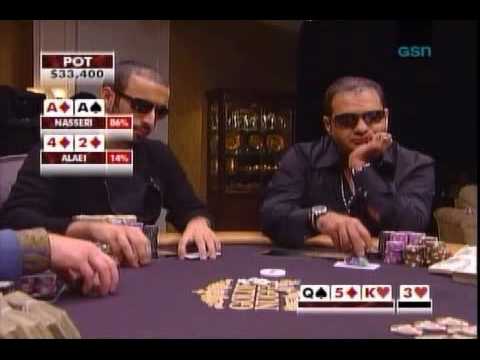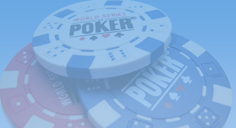Slow Playing in Poker
 Slow playing is a deceptive play in poker - also known as trapping or sandbagging. It's deceptive as a player isn't betting as much as the strength of his hand warrants. In simple terms, a player will bet when he is strong and not when he is weak. This play involves not betting or betting small when you have a big hand, in the hope that it looks week and is raised by another player.
Slow playing is a deceptive play in poker - also known as trapping or sandbagging. It's deceptive as a player isn't betting as much as the strength of his hand warrants. In simple terms, a player will bet when he is strong and not when he is weak. This play involves not betting or betting small when you have a big hand, in the hope that it looks week and is raised by another player.
A player trying to induce some action will act passive or weak. The decision to bet at a pot is usually driven by the number of players in the hand, the amount of action in the hand and of course the pot size. In addition, you would take into account what you know about the players and the hole cards that you have.
Slow Playing a Hand to Maximize Return
The slow play is often very effective for getting players who would not otherwise have bet, to enter a pot or bet above what they would, in order to try to win. To successfully 'slow play a hand', you are in actual fact trying to induce a bluff, a semi bluff or over representing a hand - all the time lurking in the background with a monster hand. Regardless of your motives, the aim should be the same. To take the maximum off your opponents. To do this you need to build the pot as you go. The danger that is always very real is that if you give a player some room to fish, from time they'll catch cards and overturn your hand. That's the price tag that comes with risk you're taking by playing the hand deceptively.
So, slow playing comes at a risk, however let's look at a couple of examples.
You are playing a shorthanded $5-$10 cash game and you have been dealt A![]() A
A![]() , under the gun. If you're like most other players, your heart goes up a few beats and you start to work out how you can get the maximum from your opponents. Do you bet it up and hope that other players have half a hand to call your bet. Do you play it slowly to tempt others in? There's no one right way to play the hand.
, under the gun. If you're like most other players, your heart goes up a few beats and you start to work out how you can get the maximum from your opponents. Do you bet it up and hope that other players have half a hand to call your bet. Do you play it slowly to tempt others in? There's no one right way to play the hand.
There are a few consideration. If you knew nothing about your table you would probably favor raising. It can often look like an early move to send a message to the table and players who have been at the table for a while will often try to move you off the hand.
If you've sussed out the table, you'll know the passive players from the aggressive ones. You'll know the players who don't defend their blinds and those that religiously raise from late. This is all information you can use to your advantage.. Let's for the same of argument, assume that it is a fairly loose table. As there's a good chance you will face a raise, hitting a board like K![]() 9
9![]() 2
2![]() can pay where your opponent has top pair. A player with KQ, KJ, AK, K10, all of which are very playable hands, will be a big dog against your aces. Worth keeping in mind that loose players will have a much wider pre flop starting range than K-10.
can pay where your opponent has top pair. A player with KQ, KJ, AK, K10, all of which are very playable hands, will be a big dog against your aces. Worth keeping in mind that loose players will have a much wider pre flop starting range than K-10.
Another option is to play it slow and check raise. Again, you should only do this if you think your opponent could donk push or stick around. Getting only one bet from your opponent isn't maximising your return - especially if you have a monster.
Playing it Slow When the board is dealt
Of course, aces is a monster pre flop hand but it's not a monster post flop. You'll make considerably more money mining for sets. You will hit every 7.5 attempts to hit. On the flop, you will be able to extract considerably more as there is more margin for what each player could actually hold. There's considerably more disguise to your hand - especially a set and so far easier to let opponents hand themselves. If you held pocket 9's on a board K![]() 9
9![]() 2
2![]() . You don't want to rush in with a huge bet and scare everyone off. At the same time, you don't want to play it too slowly. Remember, on the flop you have three betting rounds to play with. It's important to build the pot so you can justify the extraction. Betting double the pot on the river isn't going to attract many callers. It can be argued that slow playing is counter-productive as it doesn't build the pot.
. You don't want to rush in with a huge bet and scare everyone off. At the same time, you don't want to play it too slowly. Remember, on the flop you have three betting rounds to play with. It's important to build the pot so you can justify the extraction. Betting double the pot on the river isn't going to attract many callers. It can be argued that slow playing is counter-productive as it doesn't build the pot.
Is slow playing the right play?
Most players are playing to win money. The way to achieve this is to build and win pots. If you don't build the pot, you're not going to earn much from the pot. Even worse if you have a big hand! It's a far better strategy to bet your big hands, and here's why.
Example 1 - the slow play
Blinds $2-$4 and average stack sizes $400. You hold 8![]() -8
-8![]() and are raised $12 pre flop - you call. The board comes 2
and are raised $12 pre flop - you call. The board comes 2![]() -8
-8![]() -A
-A![]() . Your opponent raises $17. All other players fold - you call. The turn comes K
. Your opponent raises $17. All other players fold - you call. The turn comes K![]() . Your opponent raises $42 and you call. The river comes 3
. Your opponent raises $42 and you call. The river comes 3![]() . Your opponent checks. You bet pot size - $142. Your opponent calls and you take down a $284 pot. Your opponent flips over A
. Your opponent checks. You bet pot size - $142. Your opponent calls and you take down a $284 pot. Your opponent flips over A![]() -3
-3![]() .
.
This is a bad result. There are so many things wrong with how this was played, from not protecting the straight possibilities on the turn to letting him off with the rest of his stack! Let's see how this might have looked if you hadn't slow played.
Example 1 - the aggressive play
Blinds $2-$4 and average stack sizes $400. You hold 8![]() -8
-8![]() and are raised $12 pre flop. You raise to $42 and your opponent calls. Flop comes 2
and are raised $12 pre flop. You raise to $42 and your opponent calls. Flop comes 2![]() -8
-8![]() -A
-A![]() .. You bet $60 and are called. There's now $204 in the pot. Turn again is K
.. You bet $60 and are called. There's now $204 in the pot. Turn again is K![]() . You bet $80 and your opponent calls. Pot now $364. River is 3
. You bet $80 and your opponent calls. Pot now $364. River is 3![]() . You shove for your remaining $200 and are called. Your opponent flops over A
. You shove for your remaining $200 and are called. Your opponent flops over A![]() -3
-3![]() and you take down a $764 pot.
and you take down a $764 pot.
And so the right play is .... ? Well there isn't one. Not one that works every time. There will always be times when your up against maniac raisers that slow playing is the right play. Most of the time, it isn't. Don't assume your opponent doesn't have a hand. Assume he does and make him pay to play.



Popular Top-Lists
Recommended Visit













 Top UK Poker Options
Top UK Poker Options